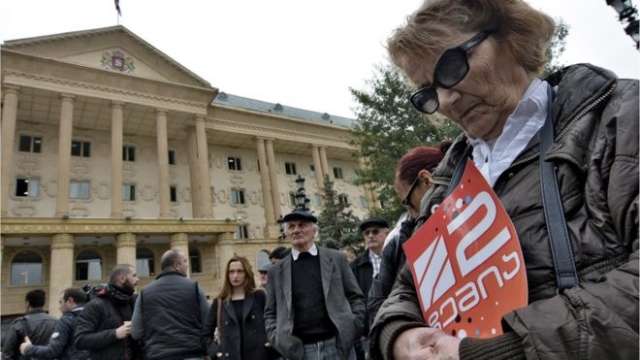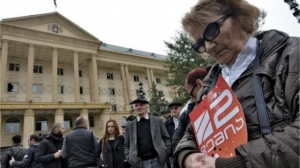BBC: Protests in Georgia over TV Station Shutdown Threat
World famous TV channels have focused on Georgia while protests and discussions are still ongoing between the government and popular Television station Rustavi 2. The channel was founded in 1994 and is the biggest and most popular station in Georgia. People of all ages gathered to protest and defend the free media channel.
The BBC reported that “thousands of people have staged a rally in Georgia to protest against the government’s alleged attempts to close the country’s most popular television station.”
Protesters gathered outside the offices of Rustavi 2, offices that have been locked after a dispute with the authorities. They accuse the government of attempting to stifle media freedom. Georgian Prime Minister Irakli Gharibashvili warned that he would respond sternly to any potential breaches of the law at the rally.
Rustavi 2 has been locked in an ongoing ownership battle since August, sparking fears that the ruling Georgian Dream coalition could compromise the independence of the channel by interfering.
Over the summer, a court froze the broadcaster’s assets after a businessman close to the coalition filed a lawsuit to claim control. Government critics and the channel’s current owners hit back, stating the planned closure of the station is part of a campaign to silent the press ahead of next year’s parliamentary elections.
"The government has decided to hand Rustavi 2 ownership over to a man under its control and that will amount to a closure of the country's most influential TV channel," Rustavi 2's deputy director, Zaal Udumashvili, told the AFP.
Udumashvili added “"That will put an end to media pluralism in Georgia and threaten the very existence of Georgian democracy."
On Wednesday the channel’s director Nika Gvaramia said a government middleman had threatened to release secretly recorded videos showing what he described as his ‘private life’ in an attempt to force him to resign.
The office of Georgia’s prosecutor general has launched a probe into his claims, the BBC has reported.
Nina Ioseliani












